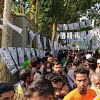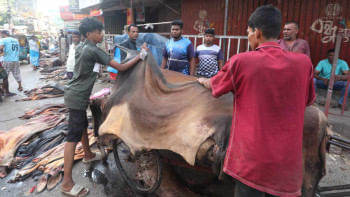Hopes and anxieties of the Bangladeshi diaspora

A number of recent op-eds and news items on the Bangladeshi diaspora in the US and the Middle East caught my attention. I have also read several knowledgeable articles and op-eds on the contribution and concerns of the diaspora published in these columns since the July uprising. There is indirect evidence that the interim government is very much aware of the roles played by the diaspora, particularly those who live in North America and the UK.
A media report, "Forex market on the mend as remittances rebound," provided some encouraging news for the new administration. It not only signals that our foreign exchange coffers will be bolstered in the coming months but also indicates a positive trend. The hard-working Bangladeshis are sending money home once again, and they foresee that things are heading the right way after the July-August uprising.
I was also glad to note that the editor of this newspaper was visiting the US a few weeks ago, and left with a very positive impression about the role of the diaspora after attending the St Gregory's High School alumni reunion held in New Jersey. He noted that he met several cricketers and other well-known Gregorians who were able to charm him with their feelings of nostalgia and patriotism for their old country. Also, worth noting, as he pointed out in his op-ed, that "there were professionals from academia, business, engineering, IT, medicine, pharmacy, and even cybersecurity."
I am curious to know if the editor of The Daily Star also met with the average diaspora in the New York tri-state area. Most of the Bangladeshi diaspora, ie, those I come across on an everyday basis in the US, have a slightly different perspective on the comings and goings in their birthplace. A majority of the Bangladeshis living in this region are hard-working men and women, many of whom are from lower middle-income groups, according to data from the Pew Research Center. I mention this group because most of those living in the tri-state area, which includes parts of New York, New Jersey, and Connecticut, are small-scale entrepreneurs or hold blue-collar jobs. I meet them occasionally and hear from them regularly, and I will present some of their concerns and aspirations from a random sample.
They are concerned about many issues, some recent and some from the immediate past. It was reassuring to learn that the Bangladesh Army Chief General Waker-uz-Zaman has vowed to back the country's interim government led by Professor Muhammad Yunus "come what may" to help the government complete key reforms so that elections could be held within the next 18 months. I will provide a short list of issues, the diaspora is concerned about, in the following paragraphs. The diaspora always pays special attention to the law and order situation in the country, particularly in the hill tracts, and the safety and security of the minority community. Rallies, human chains, protests, and demonstrations have been held in all major cities. A protest rally was held last Sunday in Boston at the historic Harvard Square in front of Harvard University to protest against the killing of Indigenous people, arson attacks on their businesses, vandalism of religious places of ethnic and religious minorities in Dighinala, Khagrachari, and Rangamati. People from Bangladeshi Hindu, Buddhist, and Muslim communities, including Indigenous families, and several Indian and American citizens participated in the protest.
The cost of living, particularly for those who live on fixed incomes and have had their livelihoods disrupted due to labour unrest and supply chain issues, is also on our minds. Personally, many of my elderly relatives and retired friends live on fixed incomes such as pensions and savings and have seen their lifestyles disrupted. With the inflation rate in the double digits, they have been experiencing the "shrinking taka." Any money sent to them buys less and less every day. My frozen personal bank account with one of the affected financial institutions has made it impossible for me to send any financial support to my relatives and charitable causes.
We are also concerned about the workers' unrest and the prevailing sense of uncertainty among the business class. Some members of the former autocratic regime have gone into hiding, and are nervous about resuming their regular activities. The flip-flop on the Constitutional Reform Commission, mass allegations against political activists and civilians alike, and blanket accusations for the misrule of the former government also surface occasionally. The current administration needs no reminder that with an estimated 13 million Bangladeshis residing abroad in 162 countries, the diaspora stands as the sixth-largest migrant group globally. Their views and actions have some influence, echoing across Bangladesh's financial and social spheres. Bangladeshi people living abroad (diaspora) often experience significant emotional and social impacts due to the hardships faced by their families still living in Bangladesh, as they maintain strong emotional connections to their homeland despite being physically distant.
Our interim leader Prof Yunus, a champion for poverty eradication, was recently in New York City to attend the United Nations General Assembly session. He was expected to meet with Max Roser, a kindred spirit. Roser is a professor at the University of Oxford's Blavatnik School of Government, where he researches global issues such as poverty, hunger, and war. In the September 24 issue of The New York Times, Roser wrote, "Poverty is not history. People around the world are still struggling to afford housing, heating, transport and healthy food for themselves and their families." The diaspora is aware that the time the interim government has is short and the tasks ahead for Prof Yunus are lengthy, but we have confidence that Prof Yunus is the right person to take the helm at the right time to make a dent in the issues we face.
Dr Abdullah Shibli is an economist and works for Change Healthcare, Inc., an information technology company. He also serves as senior research fellow at the US-based International Sustainable Development Institute (ISDI).
Views expressed in this article are the author's own.
Follow The Daily Star Opinion on Facebook for the latest opinions, commentaries and analyses by experts and professionals. To contribute your article or letter to The Daily Star Opinion, see our guidelines for submission.

 For all latest news, follow The Daily Star's Google News channel.
For all latest news, follow The Daily Star's Google News channel. 










Comments